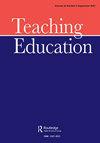创造有利条件以加强研究丰富的教学职业:来自澳大利亚研究的经验教训
IF 1.1
Q2 EDUCATION & EDUCATIONAL RESEARCH
引用次数: 6
摘要
摘要:从学生测试和学校改进措施的各种指标来看,教师工作和学校实践的数据化程度不断提高,在许多经合组织国家,这一数字持续增长。国际学生评估计划(PISA)等全球排行榜竞争推动了这种做法,“大数据”对教师收集、分析和报告数据的方式产生了重大影响。对于澳大利亚的学校来说,千禧年之交预示着“高风险”数据趋势和标准化测试的推出。在这种背景下,本文报道了澳大利亚的一项研究结果,以探讨过度数据丰富的环境对教育工作者、教师和系统领导者的影响和挑战,以及向研究更丰富的教师职业迈进的有利条件。研究结果表明,也许标准和数据不是教师的敌人,而是学生的标准化和数据化放大了机构排名和排行榜的影响。提供了有利条件,以便对什么是研究以及谁进行研究采取更全面和包容的观点,这是培养成熟的教师职业的关键。本文章由计算机程序翻译,如有差异,请以英文原文为准。
Generating enabling conditions to strengthen a research-rich teaching profession: lessons from an Australian study
ABSTRACT The increasing datafication of teachers’ work and schooling practices as evidenced through various metrics of student testing and school improvement measures have continued to grow unabated across many OECD Countries. Such practices have been fuelled by global competition for league tables such as the Programme for International Student Assessment (PISA) with ‘big data’ having a major impact on how teachers are expected to gather, analyse and report data. For schools in Australia, the turn of the millennium has heralded the ‘high stakes’ data trend and the roll-out of standardised testing. This paper reports on an Australian study’s findings, against such a backdrop, to explore the impact and challenges of an overly data-rich environment for educators, teachers and system leaders and what might be the enabling conditions to move towards a more research-rich teaching profession. The findings suggest that perhaps standards and data are not the enemy for teachers, rather it is standardisation and the datafication of students that creates an amplification of the effects of institutional rankings and league tables. Enabling conditions are offered to adopt a more comprehensive and inclusive view of what counts as research and who conducts research, key to enabling a mature teaching profession.
求助全文
通过发布文献求助,成功后即可免费获取论文全文。
去求助
来源期刊

Teaching Education
EDUCATION & EDUCATIONAL RESEARCH-
CiteScore
3.80
自引率
6.20%
发文量
15
期刊介绍:
Teaching Education is an interdisciplinary forum for innovative practices and research in teacher education. Submission of manuscripts from educational researchers, teacher educators and practicing teachers is encouraged. Contributions are invited which address social and cultural, practical and theoretical aspects of teacher education in university-, college-, and school-based contexts. The journal’s focus is on the challenges and possibilities of rapid social and cultural change for teacher education and, more broadly, for the transformation of education. These challenges include: the impact of new cultures and globalisation on curriculum and pedagogy; new collaborations and partnerships between universities, schools and other social service agencies; the consequences of new community and family configurations for teachers’ work; generational and cultural change in schools and teacher education institutions; new technologies and education; and the impact of higher education policy and funding on teacher education. Manuscripts addressing critical and theory-based research or scholarly reflections and debate on contemporary issues related to teacher education, will be considered. Papers should attempt to present research, innovative theoretical and/or practical insights in relevant current literature and debate.
 求助内容:
求助内容: 应助结果提醒方式:
应助结果提醒方式:


